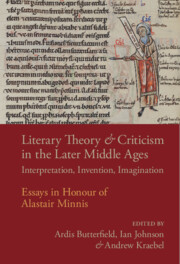Book contents
- Literary Theory and Criticism in the Later Middle Ages
- Literary Theory and Criticism in the Later Middle Ages
- Copyright page
- Contents
- Figures
- Contributors
- Preface and Acknowledgements
- Abbreviations and Conventions
- The Career and Contributions of Alastair Minnis
- Introduction
- Chapter 1 Access through Accessus
- Chapter 2 Scholastic Theory and Vernacular Knowledge
- Chapter 3 Poetics and Biblical Hermeneutics in the Thirteenth Century
- Chapter 4 Robert Holcot and De vetula
- Chapter 5 The Inspired Commentator
- Chapter 6 Guitar Lessons at Blackfriars
- Chapter 7 The Re-cognition of Doctrinal Discourse and Scholastic Literary Theory
- Chapter 8 Arts of Love and Justice
- Chapter 9 The Many Sides of Personification
- Chapter 10 Encountering Vision
- Chapter 11 George Colvile’s Translation of the Consolation of Philosophy
- Chapter 12 When Did the Emotions Become Political?
- Bibliography of the Works of Alastair Minnis
- Bibliography
- Index
Chapter 1 - Access through Accessus
Gateways to Learning in a Manuscript of School Texts
Published online by Cambridge University Press: 20 April 2023
- Literary Theory and Criticism in the Later Middle Ages
- Literary Theory and Criticism in the Later Middle Ages
- Copyright page
- Contents
- Figures
- Contributors
- Preface and Acknowledgements
- Abbreviations and Conventions
- The Career and Contributions of Alastair Minnis
- Introduction
- Chapter 1 Access through Accessus
- Chapter 2 Scholastic Theory and Vernacular Knowledge
- Chapter 3 Poetics and Biblical Hermeneutics in the Thirteenth Century
- Chapter 4 Robert Holcot and De vetula
- Chapter 5 The Inspired Commentator
- Chapter 6 Guitar Lessons at Blackfriars
- Chapter 7 The Re-cognition of Doctrinal Discourse and Scholastic Literary Theory
- Chapter 8 Arts of Love and Justice
- Chapter 9 The Many Sides of Personification
- Chapter 10 Encountering Vision
- Chapter 11 George Colvile’s Translation of the Consolation of Philosophy
- Chapter 12 When Did the Emotions Become Political?
- Bibliography of the Works of Alastair Minnis
- Bibliography
- Index
Summary
As a complement to the work of Alastair Minnis and Brian Scott on a collection of accessus or introductions to pedagogical texts copied on their own in a collection of such ’Literary Prefaces’, this essay examines the accessüs to a typical series of school texts copied together in a single thirteenth-century manuscript, Munich, Bayerische Staatsbibliothek Clm 391. The works included in this manuscript were all widely taught during the Middle Ages and are all known to scholars and available in English translations. Yet they are not automatically included in discussions of literary works studied in the Middle Ages and this essay is meant to support the implications of Minnis and Scott’s term for them.The introductory matter, sometimes more than two accessūs, is significantly more extensive at the beginning of the manuscript and as much as possible has been edited and translated in this essay. Ways that we might look positively upon repetition, variation and contradiction are suggested and the implications of the evolving formats of the introductory material throughout the manuscript are explored. It is hoped that this approach may encourage other scholars to look at the accessūs to school texts in other relevant collections.
Keywords
- Type
- Chapter
- Information
- Literary Theory and Criticism in the Later Middle AgesInterpretation, Invention, Imagination, pp. 24 - 41Publisher: Cambridge University PressPrint publication year: 2023



